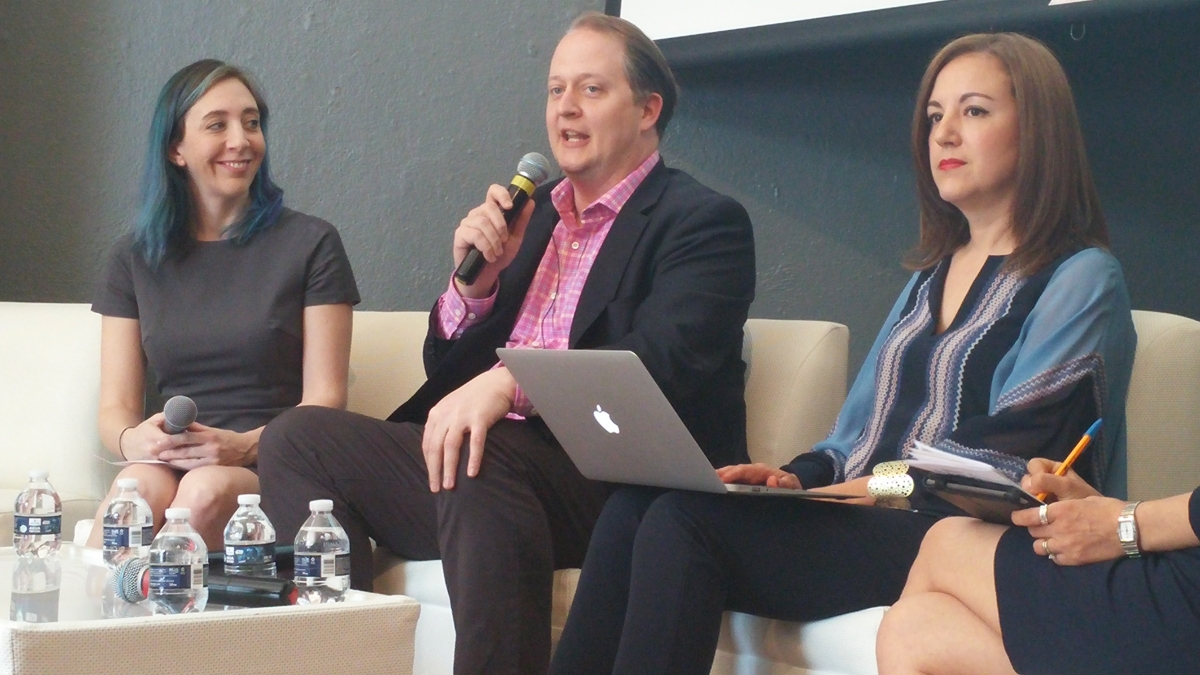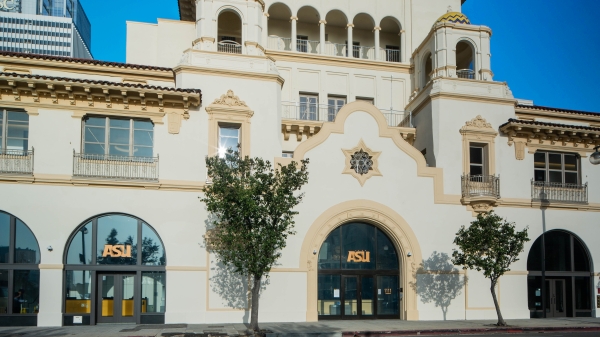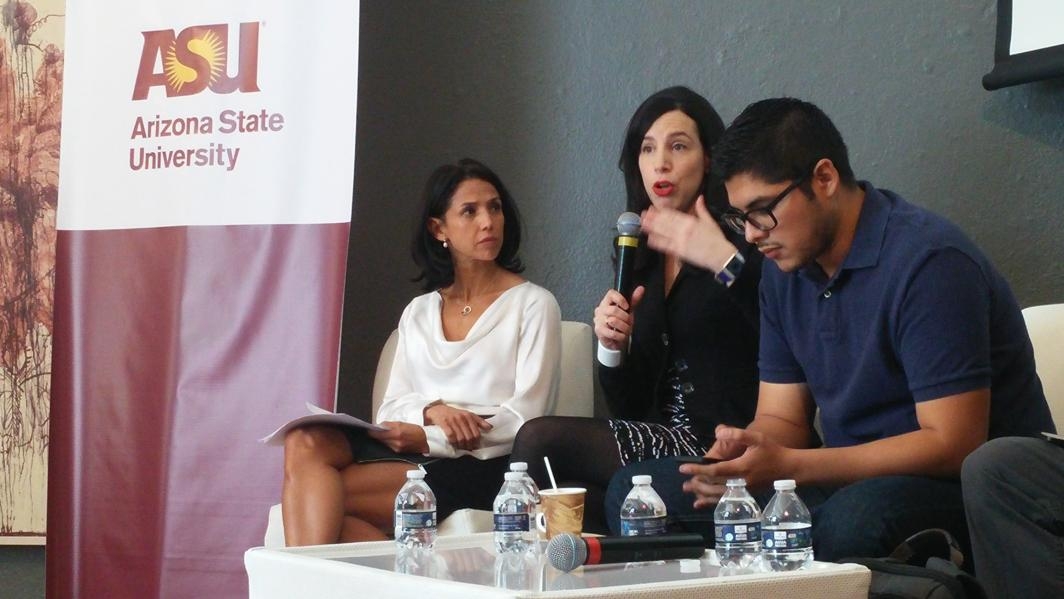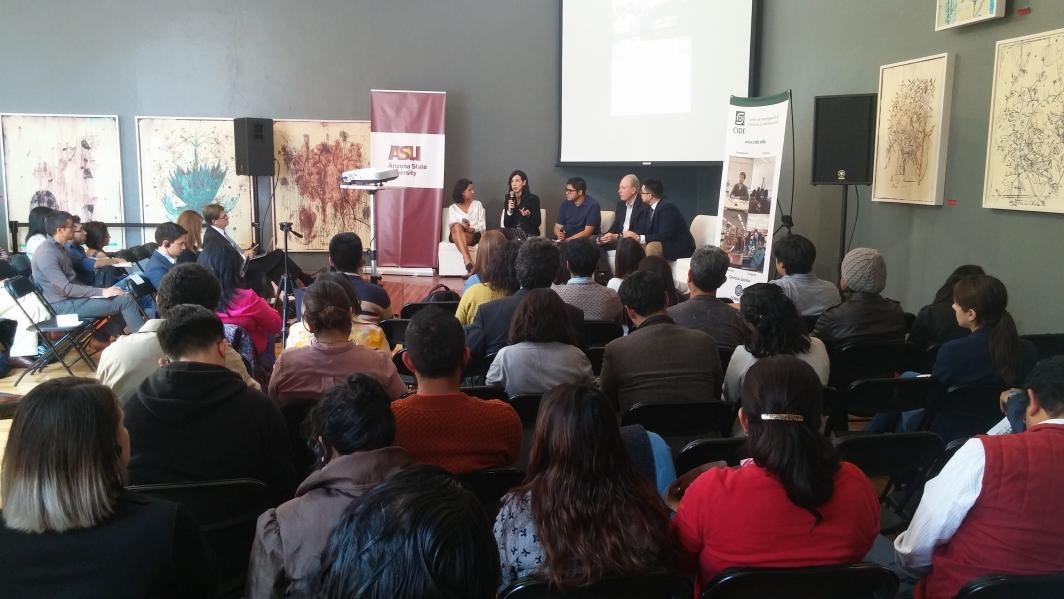Cronkite School, Mexico’s Centro de Investigación y Docencia Económicas partner for conference on journalism in the era of 'fake news'

Shane Harris, Wall Street Journal senior writer, speaks about holding government accountable during the “Digital Tensions and Journalism in the Era of Trump” workshop in Mexico City on Thursday. Also pictured is Katherine Mangu-Ward (left), a Future Tense fellow and managing editor of Reason magazine and Lina Ornelas (right), head of public policy and government affairs for Google. (Photo by Jerry Gonzalez/ASU).
Twitter tirades and trolls. “Fake news” on Facebook. Mainstream media missteps.
A creeping mistrust of journalists and political institutions are defining a cultural moment in both the U.S. and Mexico, along with fueling cross-border misunderstandings and suspicions.
To provide perspective and seek a way forward, the Walter Cronkite School of Journalism and Mass Communication at Arizona State University and Future Tense have partnered with Mexico’s Centro de Investigación y Docencia Económicas and made the issue the focus if its second annual journalism workshop in Mexico City. Media experts and nearly 100 journalists, students and faculty participated in the day-long event Thursday.
The workshop, “Digital Tensions and Journalism in the Era of Trump,” was held in the Casa Lamm Cultural Center and featured five different panels: journalism in a post-truth environment; surveillance vs. privacy; the need to hold opaque governments accountable; the challenge of covering the U.S.-Mexico border; and what journalists should do to protect themselves online
“Digital technology is taking us in an uncharted direction where we are only now beginning to see its impact and consequences,” said Christopher Callahan, dean of the Cronkite School. “We are very proud to join CIDE in examining the topic of ‘digital tensions’ in-depth through discussion panels with top professionals from Mexico and the United States.”
More than 20 speakers shared their insights, including policy analysts from Google and Mexico's Red de Derechos Digitales; journalists from The Wall Street Journal, Slate, Reason, Bloomberg News, NPR, Univision, El Universal and Horizontal. CIDE professors and Cronkite faculty members also participated.
"It's essential to learn from each other across borders and to nurture a strong culture of principled journalism in both our countries,” said Carlos Bravo Regidor, associate professor and coordinator of the master's degree program at CIDE.
The absence of principled journalism in some cases helped create the current “fake news” environment that has led to a rise in mistrust in mainstream media, said panelist and Future Tense editor Torie Bosch.
“Misinformation and fake news, in the very strict definition of fake news, existed long before this election,” Bosch said. “You could see it at the bottom of just about almost every American news website, links that said ‘promoted around the web’, and you would see a fake story about a celebrity, and we all ignored it because we didn’t think anyone really took them seriously.”
Panelists agreed that “fake news” isn’t new, but it’s risky to try to silence. Educating the public, encouraging the use of social media tools to identify less than credible parties and holding governments accountable are a better way forward.
“Governments all over the world will say ‘this journalist is spreading rumors’ and ‘this is a threat to national security,’” said Emily Parker, a panelist and digital diplomacy advisor to New America. “We’ve seen this all over the world, but we’re starting to see the United States government accusing journalists of starting rumors and fake news. And in other countries, they’ve used that exact same reasoning to crack down on journalists.”
Now more than ever journalism is of utmost importance as a worrisome message has emerged with the U.S. president declaring the press as “the enemy of the people,” said panelist and Wall Street Journal reporter Shane Harris.
“The goal of that is to undermine us in the free press as the source of truth, so that the administration becomes the source of truth,” Harris said. “We’ve seen this before in many other countries but haven’t seen it so much in ours recently.”
One of the hot topics was digital privacy. The centralization of digital mediums, including social media, has created “choke points” where surveillance can occur more easily than in the past, said Dan Gillmor, professor of practice at the Cronkite School.
“We have a major issue to think about if we’re going to have this freedom of speech, freedom to assemble and collaborate, freedom to innovate and all these other things I believe we should have,” said Gillmor, an internationally recognized author and leader in new media and citizen journalism. “It is difficult to see how we maintain those freedoms if everything is brought back to the center and a few highly powerful entities can restrict the things we should be taking for granted.”
The internet seems free, but there is a price that many don’t realize, said Jimena Moreno Gonzalez, professor and secretary general at CIDE.
“Your information is valuable,” Moreno Gonzalez said. “Nothing is free. When you build a profile, it generates information not just for commercial purposes but for political campaigns, for corporations, for telecommunications. It’s valuable, and we don’t take into account the market value of it that makes a direct impact to many utilities.”
The gathering of experts from Mexico and the U.S. gave the audience valuable points of view on very relevant and timely topics from renowned professionals. The workshop has become a unique tradition for ASU in Mexico.
"We look forward to deepening our relationship with the Cronkite School to continue advancing these objectives,” said CIDE’s Bravo Regidor.
Attendees agreed that this year’s workshop was beneficial and the topics were timely.
“It’s very important to have these type of events, in particular right now with what is going on with the U.S. administration and with the consequences that that we’re living with here in Mexico due to Donald Trump’s decisions,” said Hernán Sarquis, a journalist with Mexico’s La Política Online. “I think it’s important to maintain these ties between journalists of both nations to exchange points of views and share strategies.”
Following the workshop, Future Tense hosted an additional talk that evening exploring the question of whether the internet will "free" us all. It featured some of the daytime speakers and other Mexican thought leaders. A reception followed with ASU Mexico alumni and other guests.
Future Tense is a partnership between Arizona State University, Slate magazine and the New America think tank based in Washington.
More Law, journalism and politics

School of Politics and Global Studies director's new book explores mass violence
Why do people commit atrocities and why are certain groups, including religious and ethnic, more vulnerable to large-scale…

ASU faculty contributing to improvement of Wikipedia
Many academics have a love-hate relationship with Wikipedia. While the website has information about almost anything you can…

ASU Law students gain vital experience through Los Angeles location
Students at the Sandra Day O’Connor College of Law at Arizona State University may be concentrated in the school’s downtown…

